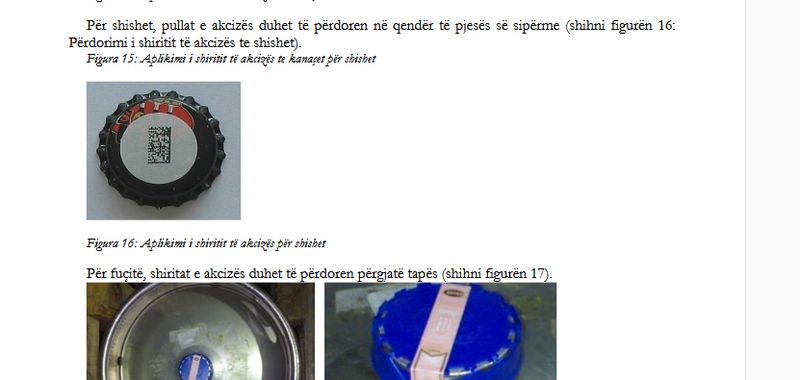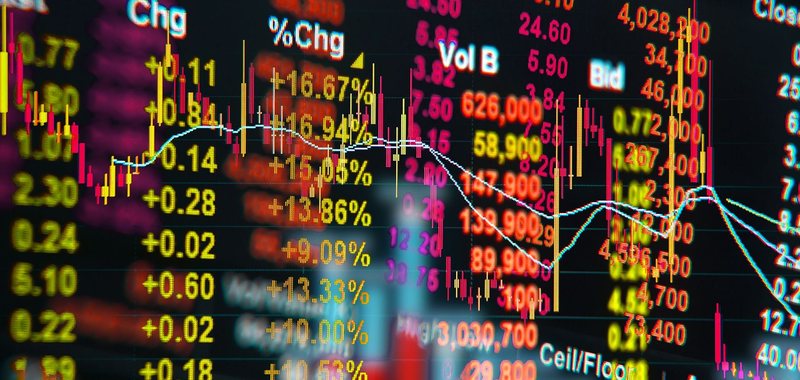Aksionet europiane pësojnë javën më të keqe që nga pushtimi rus! Dobësohet Euro

Aksionet euvropiane ranë më tej të premten, duke përfunduar javën e tyre më të keqe që nga pushtimi i plotë i Ukrainës nga Rusia në shkurt 2022, mes shqetësimeve në rritje të investitorëve mbi implikimet ekonomike të tarifave gjithëpërfshirëse të shpallura nga Shtetet e Bashkuara.
Deri në orën 11:00 me kohën e Europës Qendrore, Euro STOXX 50 ra me 2.2%, duke çuar humbjet javore në 5.9%. Indeksi më i gjerë Euro STOXX 600 ra gjithashtu me 2.1%, duke e zgjatur rënien e tij për javën në 5.4%. Indekset kryesore kombëtare ndoqën shembullin, me DAX të Gjermanisë që humbi 1.8%, CAC 40 i Francës duke rënë 1.7% dhe humbje të mëdha të regjistruara në Europën Jugore: IBEX 35 i Spanjës ra 4.1% dhe FTSE MIB i Italisë ra me 3.9%.
Stoqet financiare çuan në shkatërrim. Indeksi i Euro STOXX Banks ra me 6.4% vetëm të premten, duke i çuar humbjet javore në 10%. Banco Sabadell e Spanjës u fundos me 9.4%, Societe Generale dhe Deutsche Bank ranë të dyja mbi 8%, ndërsa UniCredit, Banco BPM dhe Intesa Sanpaolo ranë të gjitha midis 6.7% dhe 7.7%.
Tensionet u përshkallëzuan të mërkurën kur ish-presidenti i SHBA-së, Donald Trump njoftoi tarifa reciproke për të gjitha vendet, duke përfshirë një taksë prej 20% për mallrat nga Bashkimi Europian. "Paqëndrueshmëria është rritur në qiell dhe duket se do të mbetet e ngritur, pavarësisht se Presidenti Trump sinjalizoi një gatishmëri për të negociuar," tha analisti i BBVA Alejandro Cuadrado në një shënim të premten.
"Ne mund të jemi duke u përballur me një ndryshim paradigme në besimin se ekonomia e SHBA është unike elastike dhe e izoluar nga erërat e kundërta globale." Ndërkohë, presidenti francez Emmanuel Macron u kërkoi bizneseve europiane të shkurtojnë shpenzimet në Shtetet e Bashkuara dhe paraqiti mundësinë e përdorimit të instrumentit anti-shtrëngues të BE-së, i cili fuqizon Komisionin Europian për t'iu përgjigjur kërcënimeve ekonomike nga vendet e treta.
Stoqet e energjisë dhe konsumatorit ndryshojnë
Shitjet u shtrinë në sektorin e energjisë, me kompaninë kryesore spanjolle të naftës, Repsol, OMV të Austrisë, Dutch Shell dhe Eni të Italisë, të gjitha me rënie midis 2.8% dhe 3.6%. Nafta e papërpunuar Brent ra me 3% të premten në 67 dollarë për fuçi, pas një rënie prej 6.6% një ditë më parë, duke shënuar nivelin e saj më të ulët që nga gushti 2021.
"Investitorët po reagojnë ndaj dëmit të vlerësuar që këto tarifa mund t'i bëjnë tregtisë globale, dhe rrjedhimisht edhe rritjes ekonomike globale. Madhësia e tarifave është e tillë që aktiviteti i biznesit mund të ngadalësohet ndjeshëm, duke çuar në ulje të konsiderueshme të kërkesës për naftë," tha David Morrison, analist i lartë i tregut në Trade Nation.
Stoqet diskrecionale të konsumatorit gjithashtu morën një goditje. Adidas ra 2.8% pas një rënie befasuese prej 11.8% të enjten. Emrat e luksit ishin gjithashtu më të dobët: LVMH (-0,8%), Richemont (-2,9%) dhe Moncler (-0,9%). Ndërkohë, produktet mbrojtëse të konsumatorëve tërhoqën flukse strehë të sigurta. L'Oréal, Beiersdorf dhe Danone u rritën midis 2% dhe 3%, ndërsa Heineken fitoi 1.2%. "Ne mbetemi mbrojtës mbipeshë dhe financa nën peshë," tha analisti europian i kapitalit të Bankës së Amerikës, Sebastian Raedler.
Ai shtoi se bankat, të cilat kishin tejkaluar performancën e tyre nga viti në ditë me shpresat për mbështetjen fiskale gjermane dhe momentin specifik të sektorit, mbeten të pambrojtura në një mjedis makro që po përkeqësohet.
Yield-et e obligacioneve bien, euro rrëshqet
Tregjet europiane të obligacioneve u rritën, me investitorët që kërkonin strehim në borxhin sovran. Yield-et e Bundeve Gjermane ranë me 10 pikë bazë në 2.53%, duke u përkthyer në një rritje çmimi prej 1%. Yield-et në Spanjë, Itali dhe Francë ranë të gjitha me rreth 7 pikë bazë. Tregjet e parasë tani vlerësojnë plotësisht tre ulje të normave të BQE-së deri në fund të vitit, me një shans 70% që ulja e parë të vijë më 17 prill, sipas këmbimeve të indeksuara brenda natës.
Euro ra 0.6% në nën 1.10 kundrejt dollarit amerikan, pasi arriti nivelin më të lartë në shtatë muaj të enjten. “Tregu i FX po sinjalizon se tarifat do të godasin kryesisht konsumatorët vendas dhe bizneset në SHBA”, tha George Vessey, Drejtues i FX & Makro Strateg në Convera. “Edhe pse një luftë tregtare globale zakonisht do të rëndonte mbi euron, dobësitë në ekonominë amerikane janë aktualisht forca lëvizëse për EUR/USD, por për sa kohë?”, shtoi ai.

Faza finale për projektin e stadiumit “Selman Stërmasi” - Pesë skuadrat finaliste prezantojnë konceptet arkitektonike
Gara Ndërkombëtare për Projekt-Idetë Arkitekturore për Rilindjen e Stadiumit “Selman Stërmasi”, ka mbërritur në fazën finale. Pesë skuadrat finaliste......

Berisha prezanton programin për pensionistët - “Çdo pension mbi 200 euro do të rritet me 20%”
Kryetari i Partisë Demokratike, Sali Berisha, ka prezantuar programin e kësaj force politike për pensionistët. Sipas tij, çdo pensionist do të marrë të......

Si do aplikohen pullat fiskale mbi alkoolin dhe duhanin? - Nga 1 Prilli, rregulla të reja. Porositë e bëra deri në 2024-ën do të kenë afat 1 vit
Qeveria ka miratuar udhëzimin përkatës për vendosjen e pullave të akcizës dhe kodit të sigurisë, që do t’u ngjiten produkteve të duhanit, birrës dhe......

Edhe pinguinët nuk u shpëtojnë tarifave! Trump vendos masa për ishujt e pabanuar pranë Antarktidës
Një grup ishujsh të pabanuar vullkanikë pranë Antarktidës, të mbuluar nga akullnajat dhe shtëpia e shumë pinguinëve, janë përfshirë në luftën tregtare të......

Trump, i gatshëm për bisedime - Tregjet globale të aksioneve humbën 2 trilionë USD pas tarifave të fundit
Presidenti i SHBA-së, Donald Trump tha se do të ishte i gatshëm për të negociuar me vendet e tjera në rast ofertash “fenomenale”. "Nëse dikush thotë se ne do......

“Udhëtimi i Shqipërisë është unik” - Rama: BE na ka surprizuar me gatishmërinë për të na pranuar
Në takimin inaugures të Komitetit të Përbashkët Konsultativ me Komitetin Ekonomik dhe Social të BE, Kryeministri Edi Rama shprehu mirënjohjen e tij për......

Mbështetje për ide turistike inovative - Thirrje për apikime në TIP4CE, 15 mijë euro financim
Ministrja e Turizmit dhe Mjedisit, Mirela Kumbaro nëpërmjet një postimi të publikuar në rrjetet sociale u bën thirrje profesionistëve të turizmit të......

Centralet e rinj, 537 MW iu shtuan prodhimit vendas - ERE: Ndikimi, nga rritja e impianteve diellore. Privati zotëron 51.4% të totalit
537 MW iu shtuan kapacitetit prodhues vendas të energjisë elektrike gjatë vitit 2024, duke arritur një total prej 3213 MW. Sipas Entit Rregullator të......

















